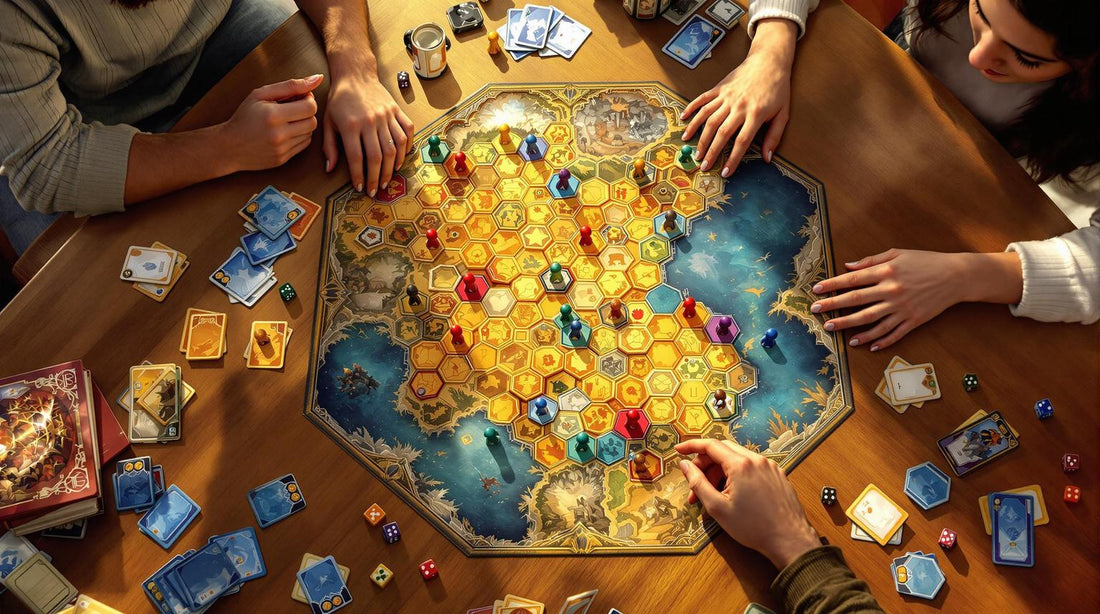Discover the Best Board Games for Every Player

Game Theory in Board Games: Iterative Strategies
Game theory helps you become a better board game player by focusing on strategic thinking, player interactions, and predicting outcomes. The key is to practice repeatedly, analyze your decisions, and refine your strategies. Here's how:
- Record and Review: Track key moves, pivotal moments, and outcomes during games.
- Analyze Performance: Identify what worked, missed opportunities, and patterns in decisions.
- Refine Strategies: Adjust tactics, create backup plans, and experiment with new ideas.
Game theory applies to both classic games like Chess and modern games like Wingspan and Catan, enhancing your ability to predict opponents' moves and optimize your own. Combine deliberate practice, observation of opponents, and basic math for smarter decisions. Over time, this structured approach leads to noticeable progress and sharper gameplay.
Game Theory 101: N-Player Games
How to Improve Strategies Step by Step
Sharpen your gameplay by combining thoughtful analysis with consistent practice. This straightforward process helps you fine-tune your strategies effectively.
Steps to Better Strategy
Improving your strategy involves a logical progression that builds on each step:
1. Record and Review
Keep track of key moves and outcomes during your games, such as:
- Opening moves and their results
- Pivotal moments that changed the game
- Final scores
- How your opponents responded
2. Analyze Performance
After each game, take time to evaluate your decisions. Pay attention to:
- Tactics that worked well and gave you an edge
- Opportunities you missed
- The sequence of decisions leading to critical moments
- Patterns in your decision-making
3. Refine Your Approach
Apply what you’ve learned to tweak your strategy:
- Improve areas where your tactics fell short and double down on what worked
- Create backup plans for unexpected scenarios
- Experiment with new ideas during practice games
Why This Method Works
This method provides a structured way to learn and improve. By tackling specific parts of your gameplay, you gain a deeper understanding of how the game works and how to approach it strategically.
The real power lies in the actionable feedback it provides. You can pinpoint exactly where you need to improve and make focused changes, which leads to:
- Clear Progress: Track your performance and see noticeable results over time
- Strategic Growth: Learn which moves are most effective to build a stronger foundation
- Informed Adjustments: Base your changes on evidence, not guesswork
With repeated practice and adjustments, you’ll continuously refine your skills and strategies. This hands-on approach ensures your tactics evolve through real experience, not just theory.
sbb-itb-1ed942f
Game Theory in Action
Game theory plays a key role in both classic and modern board games, shaping strategies and decisions during gameplay.
Game Theory in Traditional Games
The concept of Nash equilibrium is a cornerstone in games like Chess and Go. In Chess, this principle often comes into play during endgame scenarios, where players carefully plan moves to optimize King placement, time Pawn advancements, and control key squares on the board.
In tournaments, skilled players rely on game theory to:
- Predict their opponent's likely responses
- Plan sequences of moves for the best outcomes
- Create advantageous positions on the board
- Reduce risks during high-stakes moments
These strategies highlight how game theory enhances decision-making and competitive play in traditional games.
Game Theory in Modern Games
Modern board games also incorporate game theory, often blending it with innovative mechanics. Take Wingspan, for example. This game emphasizes refining strategies over multiple rounds. Players adapt their approaches based on bird cards, available food, opponents' habitat choices, and bonus objectives. For instance, a player might focus on forest birds early on but shift strategies depending on the cards they draw or how opponents play.
Catan provides another great example. Its trading system requires players to constantly reassess their strategies. They must weigh the value of resources, negotiate and dissolve trade deals, rethink settlement placements, and adjust resource production priorities. This dynamic element of strategy keeps the game engaging and unpredictable.
Methods to Test and Improve
Practice and Learning
Stick to improving one specific aspect of your decision-making during each session. After every game, take a moment to analyze your key moves and pinpoint areas where you could do better. Over time, this habit can help you spot patterns and make smarter choices. Use what you learn immediately in your next game to sharpen your strategy.
Reading Other Players
Watching how your opponents play can teach you a lot. Pay close attention to how they manage resources and make decisions. This can help you predict their next moves and adjust your own strategy accordingly. Being aware of their tactics keeps you ready to handle surprises during the game.
Basic Math in Games
Adding a bit of math to your gameplay can improve your decisions. Simple calculations can help you weigh your options, estimate outcomes, and compare the benefits of different moves. Think of it as a tool to support your strategy, not something that takes over your decision-making process.
Conclusion
Key Takeaways
Improving your board game skills requires consistent effort and thoughtful practice. By applying principles from game theory, you can develop strategies that combine mathematical calculations and psychological insights, giving you an edge across different games. The key is to practice deliberately - review your moves, experiment with new approaches, and learn from both victories and defeats. Strengthening your ability to calculate probabilities and understand your opponents will give you a strong strategic foundation.
Explore Strategy Games at Brain Games

Put your strategies to the test with games designed to challenge and enhance your skills. Brain Games offers a variety of board games that focus on building strategic thinking. Wingspan ($59.95) and Catan ($44.95) are excellent for honing resource management, while Just One ($26.95) helps improve your ability to read other players.
If you're new to strategy games, start with something like Flow ($24.95), which provides a great introduction to strategic gameplay. Check out Brain-Games.com for exclusive titles or visit Brain-Games.lv/en/ to browse the full catalog. Plus, enjoy free delivery on orders over $50.00 - perfect for expanding your collection and sharpening your skills.






